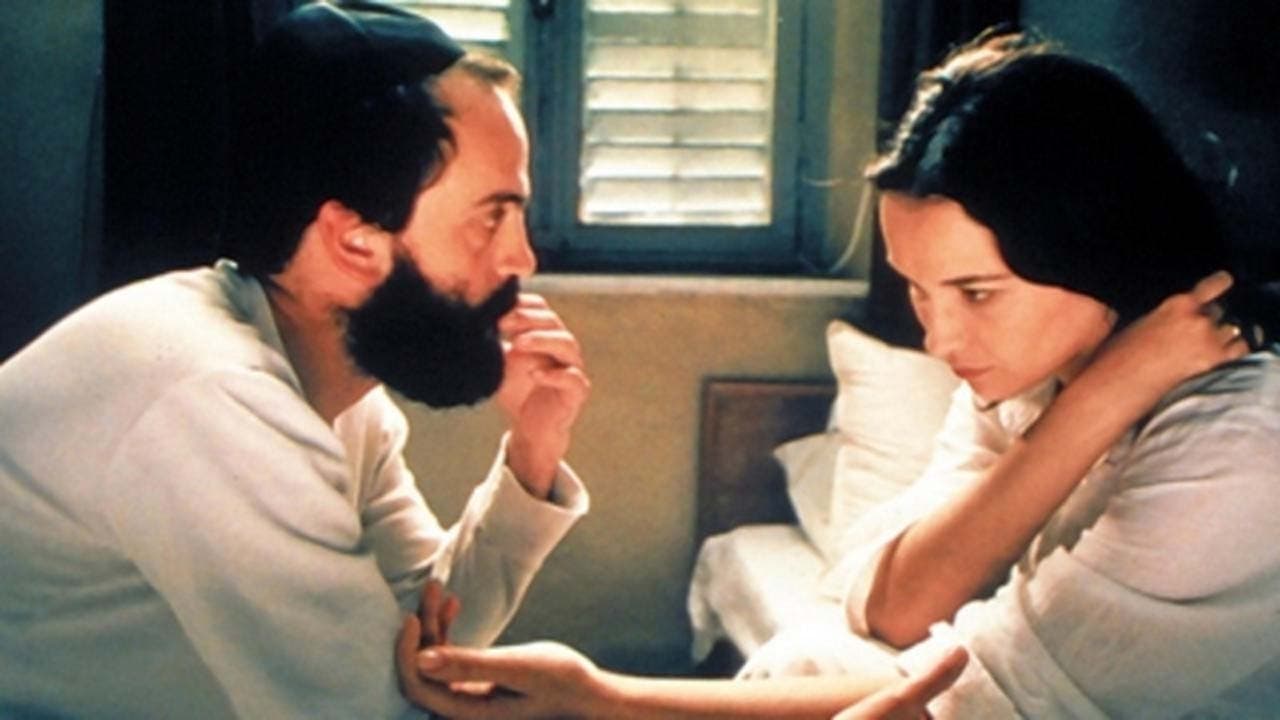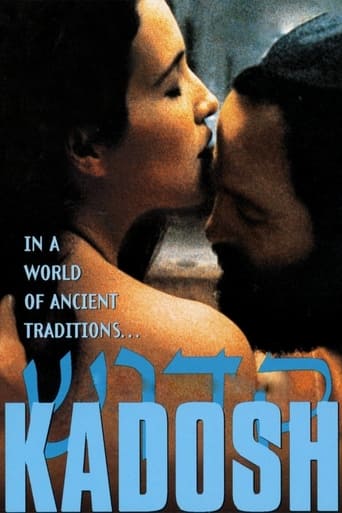



Load of rubbish!!
Let's be realistic.
Just perfect...
It's the kind of movie you'll want to see a second time with someone who hasn't seen it yet, to remember what it was like to watch it for the first time.
View More'Kadosh' is a tragedy; the tragic hero is Meir, who is induced or forced to divorce his wife Rivka because she is barren for 10 years. A lesser tragic hero is his sister-in-law Malka, who is forced into a loveless marriage with the fanatic Yussuf, who beats her because she is deceptive and unfaithful. The main actors did great jobs--the love of the sisters at the end was amazingly portrayed. The point of the film--that ultra-orthodox Judaism is misogynistic--is made with considerable nuance if not balance, and the world of ultra-orthodoxy is explored intriguingly, if not always clearly for a non-Jew.I am writing this review mainly because of disdain for some other reviewers' defense of the ultra-orthodox practices and beliefs critiqued by this film. (Perhaps it needs saying that no, I'm not an anti-Semite--I even believe, despite my preference for separation of church and state, that a _Jewish_ state of Israel _needs_ to exist, as a haven from the deep-seated and contagious bigotry of other groups against Jews.) Reviewers complain that the film doesn't show the complexity or loving relations in ultra-orthodox families, and that it is biased toward secular or 'capitalist' (!) social currents.Now, in some ways, I agree: the film oversimplifies, and Yussuf is almost a caricature. (I never saw/heard a truck with loudspeakers extolling services during my short stays in Jerusalem or Tel Aviv, though I have--not extolling Jewish services--in Chicago.) Though I don't doubt for an instant that many powerful figures in religious and other institutions, in and out of Israel, are striking copies of him--for examples with less power, one need only turn on US talk radio. A work of art can be great and noble even though, and perhaps because, it makes characters overly simple and portrays actions unrealistically--I'll stop with 'Inherit the Wind' and 'To Kill a Mockingbird'.But talk about a secular or capitalist bias reveals the blindness of these reviews: no, the real contrast point to orthodox religion is individualistic democracy: the right of each member to be treated as basically equal, to choose their own beliefs and family practices (absent harm to others) without facing organized oppression, exclusion, or condemnation, and the requirement that important social institutions forswear bias and exclusion insofar as possible. A religion (or political party) that says blacks or gays or even women are second-class should face legitimate condemnation based on the clear evidence of history that it inevitably is rooted in fears and even more shameful emotions, and that it has soul-corroding consequences for everyone it involves.The problem with the negative reviews can be highlighted by comparing Kadosh with the recent film--'12 Years a Slave'. Defenders of slavery would surely complain that that film was very biased against the Southern plantation system, that many whites in it were caricatures, and that relations on Southern estates were complex, including lots of love and family warmth that nurtured blacks while ensuring that they fulfilled the important social function of producing more slaves to keep plantations going and free slave-owners for important cultural pursuits. I saw such arguments in the US even in the 1950s--vicious and ridiculous, surely, but more importantly they're beside the point--even if a social institution is a joy to the world, every human has the right to choose to oppose it, to live outside its norms if living so doesn't harm others, and every person has the right not to be brainwashed or mass-pressured into forgoing real alternatives to those institutions.
View MoreI somehow failed for a few years to see this film, although it has been quite successful and generated a lot of discussions in Israel. I am sorry that I did not postpone indefinitely seeing it.The theme of 'Kadosh' is a very real and painful one for those who know the Jewish religious world - the place of women in the orthodox family and society. The basic situation that sits at the premises of the film is possible, the problem is that the way it is brought to screen and the 'solution' that the conflicts described receives in the movie is wrong. Gitai does not seem to have too much sympathy for men in the religious world, but his approach of picking characters that are either fanatic, or unable to express their human feeling makes the whole story seem simplistic. Neither does he a much better service to his women characters, although here at least he shows more sympathy and he also enjoys the participation of two beautiful and gifted actresses in Yael Abecassis and Meital Barda. Overall Gitai's vision is too one-sided, his cinema means are too basic, he focuses on the technical details of the Jewish religious life, which may be interesting for people who do not know them but are really not relevant at all in the context of the whole story. Starting from interesting premises what we get here is a boring film which seems longer than it is, with a very static way of acting, obsessive use of music that plays in the same register not only from a musical but also from an emotional perspective and a very inconclusive if not even confusing ending. What difference between this film and 'Ha Ushpizin' inspired from and describing the very same social landscape and which succeeded to transmit human feelings on the screen. In 'Kadosh' there are both too little cinema and too little human emotions.
View MoreI thought this movie was boring. Its not just the unattractive people in the movie, but the long scenes were the people just talk about nonsense.I was hoping to see a sacred tale of love and lust, but that is not what I saw at all. There was one sex scene that scared me. Trust me, you do not want to see that scene. What I didn't understand from this movie is the religious part of it. I would not recommend this movie to all, but there might be few who will actually like it.
View MoreA great story and well-shot. But at times, things move too slowly for my taste. This inherently feminist critique is also the type of film that begs for theological critique, because the concerns of the depicted society are only understood within the context of their theology, an understanding of the documents they follow and where they and their subsequent traditions originate. Why can the women not stand up or fight back at all? Are they really that powerless? If they studied as the men did, they could, potentially (I have studied both the Torah and the Talmud as well as Hebrew and Jewish customs). What is the perspective of the filmmaker? An ex-Jew most likely? And what alternatives are there? This anti-orthodox, anti-tradition social problem film is a gripping story, even without background details. Well worth seeing.
View More